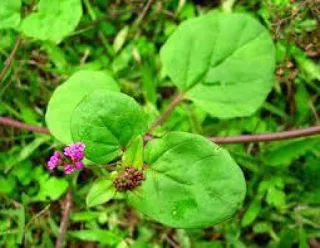The Indian names of Punarnava
Ayurveda considers man as an integral part of Mother Nature. Therefore the laws of nature are very well applicable for him also. Ancient philosophy which ponders the “secret of life and beyond” gives prime importance for health. It has understood the need of longevity and effectiveness to attain the supreme goal. Punarnava helps maintain efficient kidney and urinary functions with its diuretic, laxative, stomachic, diaphoretic, anthelminthic antispasmodic and anti-inflammatory action.
According to Ayurveda, Punarnava is bitter, cooling, astringent to bowels, useful in biliousness, blood impurities, leucorrhoea, anaemia, inflammations, heart diseases, asthma, alternatives etc.
The leaves are useful in dyspepsia, tumours, spleen enlargement and abdominal pains. According to Unani system of medicine, the leaves are appetizer, alexiteric, useful in ophthalmia, in joint pains. Seeds are tonic expectorant, carminative, useful in lumbago, scabies. The seeds are considered as promising blood purifier.
Common Names:- santhi, moto satado, ataki, sanadika, gonajali, sanadika, sothaghna, etc.
Nature:-it is a herb mostly spreads on the ground.
Leaves:-leaves are small with whitish on the lower surface and upper green.
Flowers:-flowers are very small reddish in color.
Fruits:-fruits with five coloring glandular
Medicinal Uses:-This plants root is useful.
The drug punarnava made up by this plants leaves and seeds. This drug consists the alkaloid. Real
use of this drug is diuretic but large dose can bring regarding vomiting .
Languages/Regions/Countries Names
1) Bengal --- Punarnava
2) Gujarati --- Vakhakhaparo, Dholia-saturdo
3) Marathi ----- Tambadivasu, Ghetuli
4) Tamil --------- Mukarati Kirei
5) Hindi, Sanskrit & Telugu -------- Punarnava, Raktakunda, Shothaghni, Varshabhu
6) Kanarese ----- Kommegida
7) English -------- Hogweed.
Ayurveda considers man as an integral part of Mother Nature. Therefore the laws of nature are very well applicable for him also. Ancient philosophy which ponders the “secret of life and beyond” gives prime importance for health. It has understood the need of longevity and effectiveness to attain the supreme goal. Punarnava helps maintain efficient kidney and urinary functions with its diuretic, laxative, stomachic, diaphoretic, anthelminthic antispasmodic and anti-inflammatory action.
According to Ayurveda, Punarnava is bitter, cooling, astringent to bowels, useful in biliousness, blood impurities, leucorrhoea, anaemia, inflammations, heart diseases, asthma, alternatives etc.
The leaves are useful in dyspepsia, tumours, spleen enlargement and abdominal pains. According to Unani system of medicine, the leaves are appetizer, alexiteric, useful in ophthalmia, in joint pains. Seeds are tonic expectorant, carminative, useful in lumbago, scabies. The seeds are considered as promising blood purifier.
 |
| The Indian names of Punarnava |
Common Names:- santhi, moto satado, ataki, sanadika, gonajali, sanadika, sothaghna, etc.
Nature:-it is a herb mostly spreads on the ground.
Leaves:-leaves are small with whitish on the lower surface and upper green.
Flowers:-flowers are very small reddish in color.
Fruits:-fruits with five coloring glandular
Medicinal Uses:-This plants root is useful.
The drug punarnava made up by this plants leaves and seeds. This drug consists the alkaloid. Real
use of this drug is diuretic but large dose can bring regarding vomiting .
Languages/Regions/Countries Names
1) Bengal --- Punarnava
2) Gujarati --- Vakhakhaparo, Dholia-saturdo
3) Marathi ----- Tambadivasu, Ghetuli
4) Tamil --------- Mukarati Kirei
5) Hindi, Sanskrit & Telugu -------- Punarnava, Raktakunda, Shothaghni, Varshabhu
6) Kanarese ----- Kommegida
7) English -------- Hogweed.